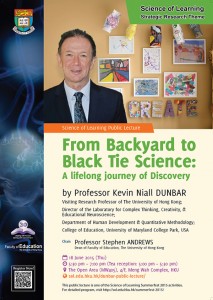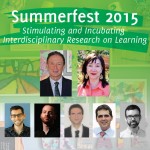From Backyard to Black Tie Science: A lifelong journey of Discovery

Visiting Research Professor of The University of Hong Kong;
Director of the Laboratory for Complex Thinking, Creativity, & Educational Neuroscience;
Department of Human Development & Quantitative Methodology;
College of Education, University of Maryland College Park, USA
Abstract
Children and Scientists share a remarkable number of attributes: curiosity, experimentation, and discovery, to name a few. But how can we facilitate the journey of child to scientist in a meaningful and lifelong manner? How can our many learning environments produce a scientifically literate population today who will be ready to confront everyday scientific issues tomorrow, especially those issues and challenges that have yet to emerge? Over the past twenty years, we have been addressing these important questions across many different contexts. First, we asked what is it that scientists really do? We investigated scientists conducting ordinary and revolutionary science—Black tie Science. Then, we investigated families with children of all ages as they visited science museums—Backyard science. What questions did they ask? Were the children really little scientists? What did parents and extended families do that fostered the strategies that comprise the Scientific Mind? We found that contexts such as Science Museums can be a gateway to long lasting learning that bridges the gap between informal backyard science and formal black tie science. Powerful learning can and does take place in informal learning contexts, BUT it can be most optimally facilitated if the interactions are structured in particular ways around core cognitive, social, and brain based mechanisms that all human beings possess. It is this kind of structuring that is most key. These are the tools that we as a society needs in order to promote and ensure the journey to an uncharted future will be maximally successful.
However, to be successful both Backyard and Black Tie science need to be conducted in ways that are structured around core cognitive, social, and brain based mechanisms that all human beings possess.
About the speaker
Kevin Niall Dunbar is Professor of Human Development and Quantitative Methodology at the University of Maryland in College Park, just outside of Washington, D.C. He is director of the Laboratory for Thinking, Reasoning & Educational Neuroscience. Dr. Dunbar is one of the co-founders of the discipline of Educational Neuroscience (2001), one of the co-founders of the National Science Foundation’s Science of Learning Centers at Dartmouth College (Hanover, N.H. USA), called the Center for Cognitive and Educational Neuroscience (CCEN; 2004), and his research pioneers the related disciplines of the Science of Learning and Educational Neuroscience.
Dr. Dunbar seeks to uncover the neural, genetic, and socio-cognitive processes, which, together, underlie human Learning, Discovery and Creativity in the Sciences, the Arts, as well as in the real world. Dr. Dunbar conducts research using contemporary neuroimaging and behavioral methodologies (fMRI, fNIRS, ERP), DNA Genotyping, and DNA Microarrays, as well as traditional educational and psychological research methods. He has conducted research on the development of scientific thinking abilities in children, students, and scientists, as well as the effects and impact of educational experience on the human brain. Currently, he is using functional Magnetic Resonance Imaging (fMRI) and functional Near Infra-red Spectroscopy (fNIRS) neuroimaging methodologies to unravel the ways that the human brain processes scientific information and how brain activity changes as a function of educational experience. Dr. Dunbar is further pioneering the use of DNA microarrays (also known as “genechips”) and DNA genotyping to understand the genetics of human learning and cognition. Using these converging approaches, he has been able to articulate key components of the scientific mind, scientific and critical thinking, and how scientists can most optimally harness these components of scientific thinking in effective ways. He has also uncovered key components of human learning that contemporary science education needs to address as we face a future with an increasingly demanding scientific world.
Professor Kevin Niall Dunbar has served on the Editorial boards of the Journal of Experimental Psychology, Cognitive Psychology, and the Canadian Journal of Experimental Psychology. He has been the recipient of innumerable university and public lecture invitations and has given invited keynote addresses in Canada, USA, France, Sweden, Germany, Italy, Belgium, and Japan. In 2013, for example, he was invited to speak at the National Academy of Sciences on science communication; the International European Gender Summit on gender and science, the Annual meeting of the American Psychological Society, and the NSF Emerging Frontiers in Engineering. His work is of broad interest to those in educational policy and education, and he has attracted esteemed invitations from scientists across multiple disciplines; for example, he has been invited to speak to Geophysical scientists, Biologists, Engineers, and Immunologists. In winter 2015, he has been invited to present a prestigious address at The London School of Economics.
Professor Dunbar was born in the United Kingdom of Irish parents who returned to Ireland when he was a young boy, where he grew up. He received both his Bachelor’s and his Master’s degree in Logic & Psychology from the University College Dublin-National University of Ireland, in Dublin, Ireland (BA,1977; MA, 1979). He received his PhD in Psychology from the University of Toronto (1985), and was a post-doctoral fellow in the Department of Psychology at Carnegie-Mellon University to conduct research with Professor David Klahr on the development of scientific thinking (1985-1988. Professor Dunbar was a professor at McGill University in Montreal from 1988 to 2001, being promoted from Assistant, to Associate, and to Full professorships. In 2001, he was recruited to Dartmouth College (Hanover, N.H.) as a Full Professor in both the Departments of Psychological and Brain Sciences and the Department of Education. In 2007, he became Full Professor in the Department of Psychology at the University of Toronto, and, in 2011, he was thrilled to take on a Full Professorship at the University of Maryland. Professor Dunbar has been an invited visiting scholar at Stanford University in Stanford, California (1991-1992) and at the renowned hospital and research institute called, Istituto San Raffaele in Milan, Italy (1998-1999).
Email: kndunbar@umd.edu
Web sites: http://www.education.umd.edu/Academics/Faculty/Bios/index.cfm?URLID=kndunbar and http://www.mnc.umd.edu/faculty/dunbar
See http://umd.academia.edu/KevinDunbar for pdfs of publications
Name and Affiliation in brief
Professor Kevin Niall Dunbar
Director: Laboratory for Thinking, Reasoning, and Educational Neuroscience
Professor: Department of Human Development and Quantitative Methodology
College of Education, University of Maryland College Park




